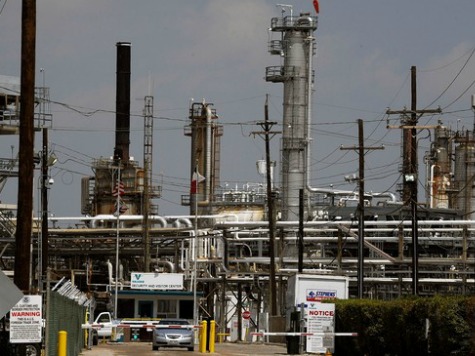The United States became the world’s largest natural gas producer in 2010 and is streaking past Saudi Arabia to become the world’s largest producer of petroleum liquids, according to the International Energy Agency. Despite scare tactics by the Left that a “peak oil” event took place in the 1990s and global production was in terminal decline, the U.S. in the last three years has experienced the fastest growth in oil and gas production in the history of the planet.
The United States surpassed all other countries this year with daily crude oil and other petroleum liquids reaching 11 million barrels per day (mbd). Since the beginning of 2011, U.S. liquid fuels grew by more than 4 mbd, including 3 mbd of crude oil. The growth of U.S. production has been the “main factor counterbalancing the supply disruptions on the global oil market” and “has contributed to a decrease in crude oil price volatility since 2011”, according to the U.S. Energy Information Agency (EIA).
Most analysts assumed July 2008’s production of 81.73 mbd as the world oil production peak, including crude oil, lease condensate, oil sands, and natural gas plant liquids. If natural gas plant liquids and oil sands were excluded, analysts would have deemed 2005 to be the peak at 72.75 mbd.
Peak oil became the rallying cry for the United Nations at their 2010 Cancun climate change meeting. Many influential academics from the British Royal Academy called for “Second World War-style rationing in rich countries to bring down carbon emissions” and to maintain emerging market growth. The U.N. demanded developed nations’ subsidized “investments” in renewable energy sources, such as solar and wind, rise to $1 trillion a year by 2030.
However, despite the supposed crisis, world oil production continued to rise to a record 92.6 mbd in June of 2014 and demand now exceeds supply by over 1 mbd. Half of that increase in oil production came from the United States and Canadian development of “tight oil” from hydraulic fracturing of shale deposits and mining of oil sands deposits.
U.S. production of oil could have been another 1.5 mbd higher, but booming U.S. oil and natural gas production overwhelmed the nation’s pipeline and rail-tanker infrastructure. Over-supply has caused a decline in gas drilling and has led to a supply glut of oil. The spot prices for West Texas Intermediate crude at the Midland, Texas hub now sells for an $8 discount to the price at the Cushing, Oklahoma hub, which is selling at a $9 discount to the “Brent crude” international price.
Cheap energy is beginning to drive a boom in metals-based manufacturers. The EIA’s Annual Energy Outlook 2014 projects that “shipments for metals-based industries will increase substantially from 2012 to 2040 due to the increased availability and lower cost of natural gas.” EIA expects growing international competitiveness of the U.S. based metal industries will spur innovations that will “contribute to growth, particularly in the computers and electronic products and transportation equipment industries.”
Oil drilling was pioneered in the United States in 1859 when “Colonel” Edwin Drake drilled down 57 feet at Oil Creek Pennsylvania to find “rock oil” in commercial quantities. America remained the world’s largest oil producer from 1870 to 1970, before being passed by the Middle East in the 1970s and Saudi Arabia in 1991. During that period, American domestic oil at a third of world costs drove U.S. manufacturing dominance.
Oil production was also the deciding factors in America’s victories in both World Wars in the 20th Century, where oil was 50% of all European shipments. According to U.S. Commanding General Omar Bradley, “Amateurs study tactics, professionals study logistics.”
Once the U.S. lost its “comparative advantage” in energy costs, about half of American manufacturing jobs were lost as U.S. companies went off-shore to stay competitive with cheap labor. But by regaining its position as the world’s dominant oil and gas producer, America seems destined to again be that economic “Shining City on a Hill.”
Chriss Street suggests that if you are interested in energy issues,
please click on
California May Face Similar Utility Crisis that Caused Gray Davis Recall

COMMENTS
Please let us know if you're having issues with commenting.